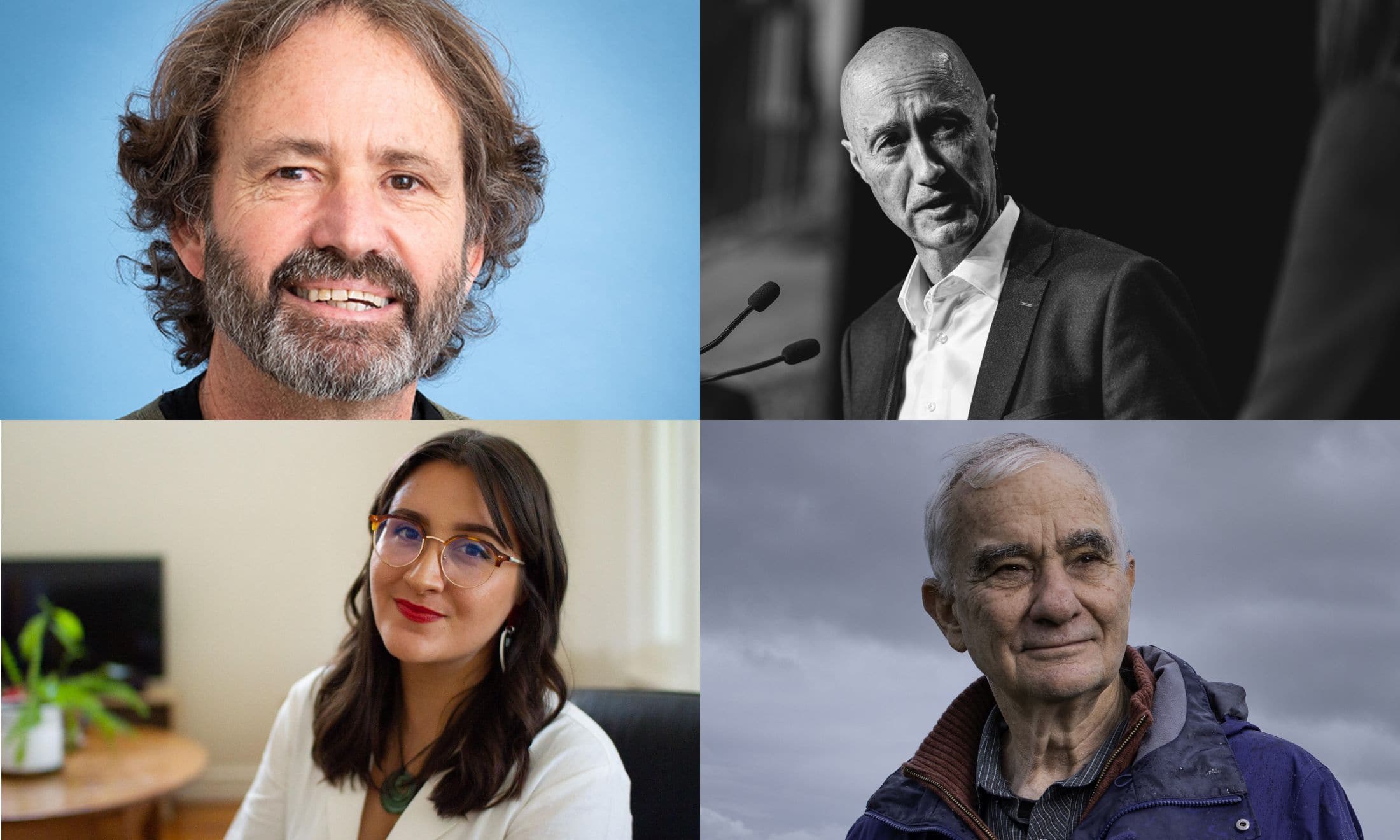
THE CRUCIAL DECADE
Paul Tapsell, Mike Joy, Dave Lowe + Kim Hill
Kim Hill invites Paul Tapsell (Te Arawa, Tainui), Mike Joy and Dave Lowe to explain how we can respond to the climate crisis and transform our lands, waterways and communities. [Kera Sherwood-O’Regan (Kāi Tahu) is no longer able to attend.]
Our panellists all agree that, when it comes to climate, there is no time to delay and we must act now, but what does action look like?
In Kāinga: People, Land, Belonging (BWB Texts) Paul Tapsell looks at the legacy of colonisation and how alienation from traditional Māori settlements and whenua (land) has become part of a wider story of environmental degradation and system collapse. He argues that only a complete step-change, one that embraces kāinga, can transform our lands and waterways, and potentially become a source of inspiration to the world.
In both Inherited Pollution and Mountains to the Sea (both published by BWB Texts) leading freshwater ecologist in Aotearoa Mike Joy calls for governments to listen to climate scientists and explores how we all need to play our part in supporting a shift away from growth at any cost.
Pre-2020, an alarmist was someone who exaggerated a danger, thus needlessly causing worry or panic, while today it describes someone who justifiably raises the alarm about a global danger to the Earth’s biosphere. In The Alarmist: Fifty Years Measuring Climate Change (THWUP), which won the E.H. McCormick Prize for a best first work of General Non-Fiction, Dave Lowe explains what he’s learned from 50 years of climate research and why he’s hopeful young people can make a difference.
PLEASE NOTE: Disability activist Kera Sherwood-O’Regan (contributor to Climate Aotearoa, published by Allen & Unwin) is no longer able to attend.
Buy the pukapuka here:
Paul Tapsell: Kainga: People, Land & Belonging | Mike Joy: Mountains To Sea | Dave Lowe: The Alarmist – Fifty Years Measuring Climate Change | Climate Aotearoa (ed. Helen Clark, featuring Kera Sherwood-O’Regan)
Catch up on the kōrero with our 2022 Pukapuka Talks podcast:
With thanks to Chia Sisters as well as Allen & Unwin, BWB Texts and Te Herenga Waka University Press.

Paora (Paul) Tapsell
Paora (Paul) Tapsell (Te Arawa, Tainui) was raised in the Bay of Plenty and Waikato, where his customary Māori knowledge was passed to him by his tribal marae elders. He has been a senior lecturer in Museums and Cultural Heritage at University of Auckland; Dean, Professor and Chair of Māori Studies at University of Otago; and the Director and Professor of the new Indigenous Studies Program at University of Melbourne. Recently Paul became Principal at Takarangi Research, leading five Aotearoa–Australian socially responsible research projects. Outside of his professional life, he has found time to balance fatherhood, sports, voluntary and tribal duties, as well as establishing Maorimaps.com, digitally relinking thousands of disconnected Māori to their tribal home communities.

Kera Sherwood-O’Regan
Kera Sherwood-O’Regan (Kāi Tahu) is the impact director at social impact creative agency, Activate Agency. With a background in political science and public health, Kera has over 15 years’ experience in climate campaigning. She is a Climate Reality Leader, founding member of SustainedAbility, and former board member of OraTaiao: The New Zealand Climate and Health Council. Kera works annually at the United Nations Climate Negotiations supporting the International Indigenous Peoples’ Forum on Climate Change. As a proudly disabled and Indigenous woman, Kera’s work centres on structurally oppressed communities in social change, and crosses the intersections of Indigenous & disability rights, health and climate change.

Dave Lowe
Dave Lowe is an atmospheric chemist and a lead author of the 2007 Nobel Prize-winning IPCC Fourth Assessment Report on climate change. In the early 1970s he set up a monitoring station at Baring Head to provide the world’s first evidence of rising atmospheric CO2 in the southern hemisphere mid-latitudes. He has worked in laboratories in the US, Germany and Aotearoa and has taught atmospheric chemistry at Victoria University of Wellington, where he is an adjunct professor. Today, Dave runs an independent business focused on science education and sustainability. He is one of the last surviving attendees of the world’s first atmospheric CO2 conference, in 1975.

Mike Joy
Mike Joy is an outspoken advocate for environmental protection in Aotearoa. He researches ecological modelling, bioassessment, environmental science, environmental policy and energy futures. He has received numerous recognition for his work, including the inaugural New Zealand Universities Critic and Conscience Award in 2017. He is based at the Institute for Governance and Policy Studies at Victoria University of Wellington – Te Herenga Waka, where he is researching the interface between science and policy. Follow him on Instagram @m.k.joy

Kim Hill (Chair)
Kim Hill is an Aotearoa broadcaster who currently presents the programme ‘Saturday Morning’ on RNZ. Her early career included stints working for radio and newspapers in Nelson, Greymouth and Gisborne, before moving to Radio New Zealand in Te Whanganui-a-Tara Wellignton and starting on the programme ‘Checkpoint’. From 1993 to 2002 she was the host of the daily morning ‘Nine to Noon’ programme. Notable interviews from this time included the Dalai Lama, Nelson Mandela, Jeffrey Archer, and Monica Lewinsky. In April 2002, Hill began hosting ‘Saturday Morning’. She was named International Radio Personality of the Year in 2012.
THEATRE ROYAL
Sun 23 Oct | 10.00am
90 min
Pay What You Can (PWYC)